自考英语笔记
自考英语(一)课堂笔记完整版(12)

Unit6(第17讲—第19讲) 4. Scientists know that the combination of extreme heat and pressure changes carbon into diamonds. extreme在句中做形容词⽤,意思是“极度的”,如: 1) Extreme cold can wake a hibernating animal. (极度的寒冷能使正在冬眠的动物苏醒。
) 2) They will have to endure extreme discomfort in winter. (冬天时,他们将不得不忍受极度的不适。
) change…into意思是“把…转变为…”,如: 1) Water changes into vapour when heated. (⽔加热后转变为蒸⽓。
) 2) Go to the bank and you can easily change these dollars into RMB. (你去银⾏就能很容易地把这些美元换成⼈民币。
) 5. Such heat and pressure exist only in the hot, liquid mass of molten rock deep inside the earth. 请注意such与so之间的不同⽤法。
such后⾯接名词,⽽so后⾯接形容词或副词。
如: 1) I don't believe he could make such a mistake. (我相信他不会犯这样的错误的。
) 2) How can you go out on such a rainy day?(在这样的⾬天⾥,你怎么能出门?) 3) He spoke so fast that I couldn't follow. (他说话太快,我听不懂。
) 4) I'm so glad you could come. (你能来我真⾼兴。
自考“英语(一)”笔记(2)
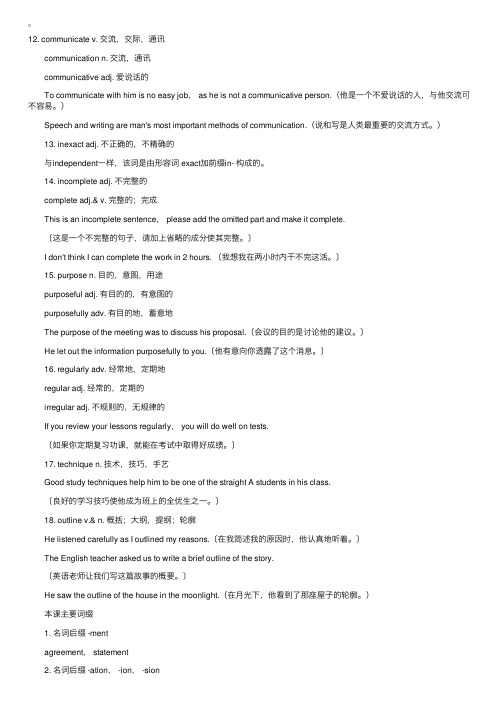
12. communicate v. 交流,交际,通讯 communication n. 交流,通讯 communicative adj. 爱说话的 To communicate with him is no easy job, as he is not a communicative person.(他是⼀个不爱说话的⼈,与他交流可不容易。
) Speech and writing are man's most important methods of communication.(说和写是⼈类最重要的交流⽅式。
) 13. inexact adj. 不正确的,不精确的 与independent⼀样,该词是由形容词 exact加前缀in- 构成的。
14. incomplete adj. 不完整的 complete adj.& v. 完整的;完成 This is an incomplete sentence, please add the omitted part and make it complete. 〔这是⼀个不完整的句⼦,请加上省略的成分使其完整。
〕 I don't think I can complete the work in 2 hours. 〔我想我在两⼩时内⼲不完这活。
〕 15. purpose n. ⽬的,意图,⽤途 purposeful adj. 有⽬的的,有意图的 purposefully adv. 有⽬的地,蓄意地 The purpose of the meeting was to discuss his proposal.〔会议的⽬的是讨论他的建议。
〕 He let out the information purposefully to you.〔他有意向你透露了这个消息。
〕 16. regularly adv. 经常地,定期地 regular adj. 经常的,定期的 irregular adj. 不规则的,⽆规律的 If you review your lessons regularly, you will do well on tests. 〔如果你定期复习功课,就能在考试中取得好成绩。
自考英语重点笔记
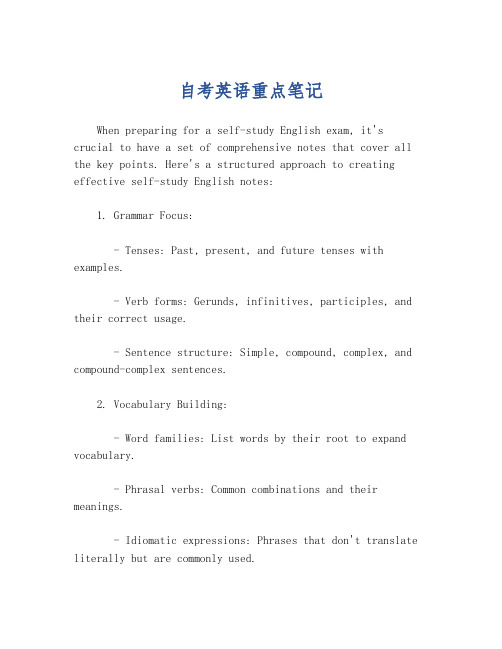
自考英语重点笔记When preparing for a self-study English exam, it's crucial to have a set of comprehensive notes that cover all the key points. Here's a structured approach to creating effective self-study English notes:1. Grammar Focus:- Tenses: Past, present, and future tenses with examples.- Verb forms: Gerunds, infinitives, participles, and their correct usage.- Sentence structure: Simple, compound, complex, and compound-complex sentences.2. Vocabulary Building:- Word families: List words by their root to expand vocabulary.- Phrasal verbs: Common combinations and their meanings.- Idiomatic expressions: Phrases that don't translate literally but are commonly used.3. Reading Comprehension:- Skimming: Techniques for quickly identifying the main idea.- Scanning: How to find specific information within a text.- Critical reading: Analyzing the text for deeper understanding and inference.4. Writing Skills:- Essay structure: Introduction, body paragraphs, and conclusion.- Formal and informal language: When and how to use each.- Common writing errors: Subject-verb agreement, articles, and prepositions.5. Listening Practice:- Active listening: Strategies for better comprehension.- Note-taking: How to jot down key points while listening.- Distinguishing between similar sounds: Practice withminimal pairs.6. Speaking Proficiency:- Pronunciation: Correct articulation of difficult sounds.- Fluency: Building sentences without long pauses.- Conversational skills: Questions, responses, andturn-taking.7. Cultural Notes:- Social norms: Understanding cultural references and etiquette.- Slang and colloquialisms: Usage in different regions.8. Exam Strategies:- Time management: Allocating time for each section of the exam.- Stress management: Techniques to stay calm duringthe exam.- Multiple-choice questions: Tips for eliminatingwrong answers.9. Practice Exercises:- Sample questions: Types of questions that could appear on the exam.- Answer key: Solutions with explanations.10. Resources:- Recommended reading: Books, articles, and websites for further study.- Online tools: Language learning apps and websites.- Study groups: Benefits and how to find or form one.Remember, consistency is key in language learning. Regularly review your notes, practice speaking, and immerse yourself in the language as much as possible. Good luck with your self-study journey!。
自考英语(一)课堂笔记完整版(6)
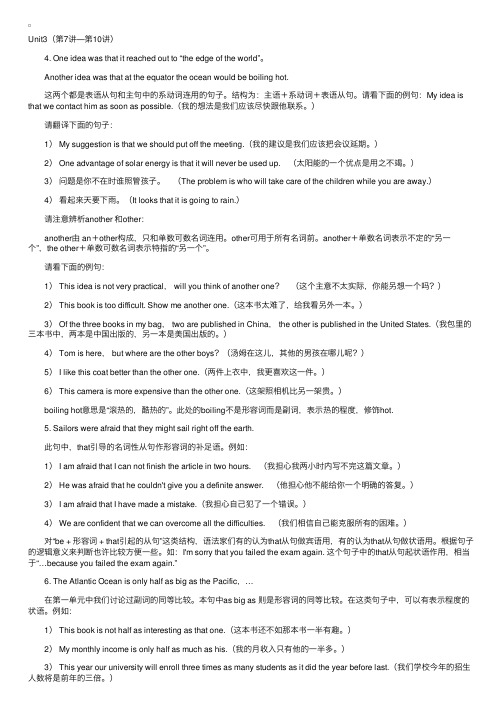
Unit3(第7讲—第10讲) 4. One idea was that it reached out to “the edge of the world”。
Another idea was that at the equator the ocean would be boiling hot. 这两个都是表语从句和主句中的系动词连⽤的句⼦。
结构为:主语+系动词+表语从句。
请看下⾯的例句:My idea is that we contact him as soon as possible.(我的想法是我们应该尽快跟他联系。
) 请翻译下⾯的句⼦: 1) My suggestion is that we should put off the meeting.(我的建议是我们应该把会议延期。
) 2) One advantage of solar energy is that it will never be used up. (太阳能的⼀个优点是⽤之不竭。
) 3)问题是你不在时谁照管孩⼦。
(The problem is who will take care of the children while you are away.) 4)看起来天要下⾬。
(It looks that it is going to rain.) 请注意辨析another 和other: another由 an+other构成,只和单数可数名词连⽤。
other可⽤于所有名词前。
another+单数名词表⽰不定的“另⼀个”,the other+单数可数名词表⽰特指的“另⼀个”。
请看下⾯的例句: 1) This idea is not very practical, will you think of another one? (这个主意不太实际,你能另想⼀个吗?) 2) This book is too difficult. Show me another one.(这本书太难了,给我看另外⼀本。
英语二自学教程笔记
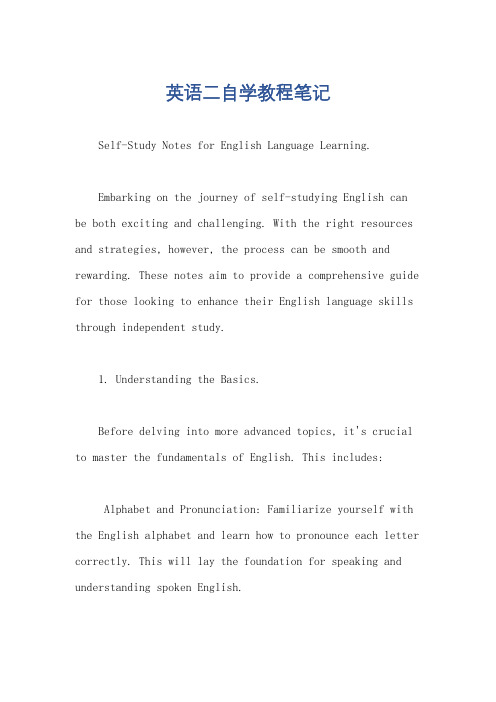
英语二自学教程笔记Self-Study Notes for English Language Learning.Embarking on the journey of self-studying English can be both exciting and challenging. With the right resources and strategies, however, the process can be smooth and rewarding. These notes aim to provide a comprehensive guide for those looking to enhance their English language skills through independent study.1. Understanding the Basics.Before delving into more advanced topics, it's crucial to master the fundamentals of English. This includes:Alphabet and Pronunciation: Familiarize yourself with the English alphabet and learn how to pronounce each letter correctly. This will lay the foundation for speaking and understanding spoken English.Vocabulary: Building a rich vocabulary is essentialfor effective communication. Start by learning common words and phrases, and gradually expand your vocabulary through reading and listening to native speakers.Grammar: Understanding the rules of English grammar is key to writing and speaking correctly. Master the basics of sentence structure, parts of speech, and punctuation.2. Improving Listening Skills.Listening is a crucial skill in language learning. Here are some tips to improve your listening abilities:Watch English Movies and TV Shows: This is a great way to immerse yourself in the language and improve your understanding of spoken English. Start with subtitles if necessary, and gradually try to understand the dialogue without them.Listen to English Music:除了看电影和电视节目,听英语音乐也是提高听力技能的好方法。
自考英语(一)课堂笔记完整版(8)
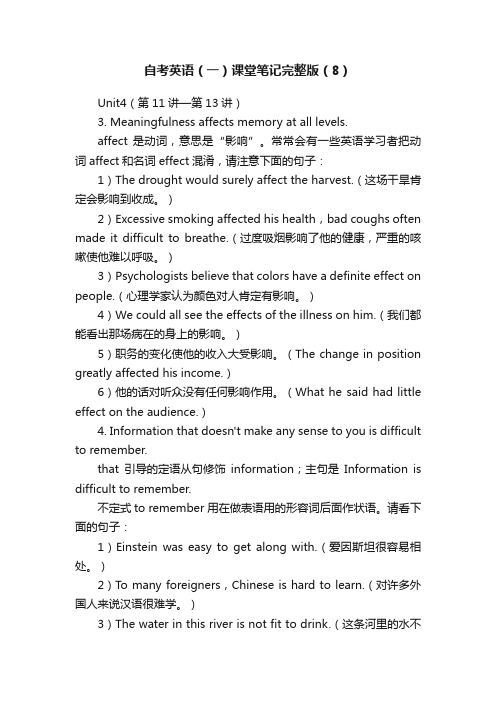
自考英语(一)课堂笔记完整版(8)Unit4(第11讲—第13讲)3. Meaningfulness affects memory at all levels.affect 是动词,意思是“影响”。
常常会有一些英语学习者把动词affect和名词effect混淆,请注意下面的句子:1)The drought would surely affect the harvest.(这场干旱肯定会影响到收成。
)2)Excessive smoking affected his health,bad coughs often made it difficult to breathe.(过度吸烟影响了他的健康,严重的咳嗽使他难以呼吸。
)3)Psychologists believe that colors have a definite effect on people.(心理学家认为颜色对人肯定有影响。
)4)We could all see the effects of the illness on him.(我们都能看出那场病在的身上的影响。
)5)职务的变化使他的收入大受影响。
(The change in position greatly affected his income.)6)他的话对听众没有任何影响作用。
(What he said had little effect on the audience.)4. Information that doesn't make any sense to you is difficult to remember.that引导的定语从句修饰information;主句是Information is difficult to remember.不定式to remember 用在做表语用的形容词后面作状语。
请看下面的句子:1)Einstein was easy to get along with.(爱因斯坦很容易相处。
自考英语二复习笔记
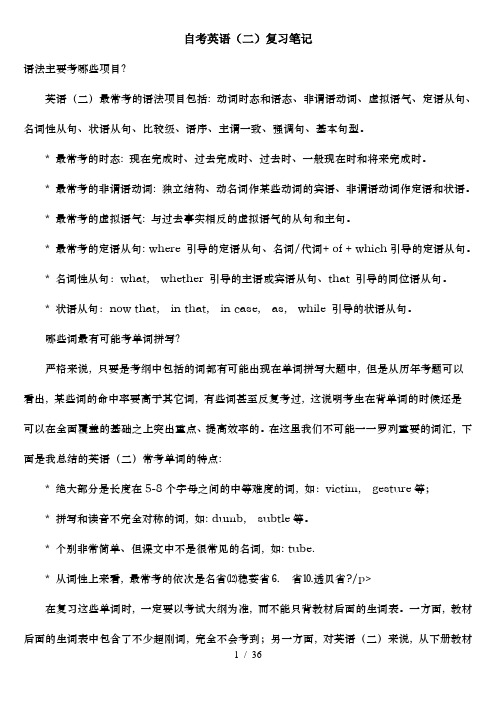
自考英语(二)复习笔记语法主要考哪些项目?英语(二)最常考的语法项目包括: 动词时态和语态、非谓语动词、虚拟语气、定语从句、名词性从句、状语从句、比较级、语序、主谓一致、强调句、基本句型。
* 最常考的时态: 现在完成时、过去完成时、过去时、一般现在时和将来完成时。
* 最常考的非谓语动词: 独立结构、动名词作某些动词的宾语、非谓语动词作定语和状语。
* 最常考的虚拟语气: 与过去事实相反的虚拟语气的从句和主句。
* 最常考的定语从句: where 引导的定语从句、名词/代词+ of + which引导的定语从句。
* 名词性从句:what, whether 引导的主语或宾语从句、that 引导的同位语从句。
* 状语从句:now that, in that, in case, as, while 引导的状语从句。
哪些词最有可能考单词拼写?严格来说, 只要是考纲中包括的词都有可能出现在单词拼写大题中, 但是从历年考题可以看出, 某些词的命中率要高于其它词, 有些词甚至反复考过, 这说明考生在背单词的时候还是可以在全面覆盖的基础之上突出重点、提高效率的。
在这里我们不可能一一罗列重要的词汇, 下面是我总结的英语(二)常考单词的特点:* 绝大部分是长度在5-8个字母之间的中等难度的词, 如:victim, gesture等;* 拼写和读音不完全对称的词, 如: dumb, subtle等。
* 个别非常简单、但课文中不是很常见的名词, 如: tube.* 从词性上来看, 最常考的依次是名省⑿稳荽省⒍省⒑透贝省?/p>在复习这些单词时, 一定要以考试大纲为准, 而不能只背教材后面的生词表。
一方面, 教材后面的生词表中包含了不少超刚词, 完全不会考到;另一方面, 对英语(二)来说, 从下册教材生词表中出的单词只占三分之一, 不可能涵盖所有要考的内容。
同样在复习时一定要讲究准确性, 确保背一个记准一个, 而不能只是记个大概, 最后写出来每个都差不多但每个都有错。
自考英语二(课堂笔记_课文部分)

综合英语二(课堂笔记)Unit11、主语+find/think+it+形容词+to do(it为形式宾语,to do是真正的主语)We find it no easy to master two foreign language in the same time.2、in、at不译为“上、里”时,译为“用、以”3、下列动词要用动名词做宾语。
practice/finish/stop/delay/suggest/consider/can’t help(禁不住)4、It is+形容词+to do(for…to)1)、It is very important to do more exercise.1)、It is very important for us to study English well.5、抽象名词(may、chance、power、decision)+ to do 不定式做抽象名词的定语。
6、无生命名词很有可能后面加上过去分词,有生命名词很有可能加上现在分词。
7、不定式放在句尾,译为“以便”,目的状语。
8、主语+系动+to do(将要)主语+系动+about to do(即将)主语+系动+going to do(打算做某事)课后练习翻译答案:P101、Research shows the successful language learners are similar in manyways.2、Language learning is active learning learners should look for everychance to use the language.3、Learning language should be independent active and purposeful.4、Learning a language is different from learning math.5、Teachers often communicate the successful experience in language. P121、They find it hard to master a foreign language.2、The research shows that the successful language learners are similarin many ways.4、We are willing to help our friends.Unit21、lead…with 以…领先The company leads the city with the best services.2、形容词本身有其他词修饰时,常放在名词后做后置定语。
自考00015英语二重点语法复习笔记

自考00015英语二重点语法复习笔记1. 一般现在时(Simple Present Tense)1.1 定义与用法:一般现在时表示经常性、习惯性的动作或存在的状态。
常用时间状语有:always, usually, often, sometimes, every day/week/month/year, on weekends等。
1.2 谓语动词的构成:一般现在时的谓语动词构成:(1)一般动词:原形(2)第三人称单数(he/she/it):动词原形 + "s" / "es"(3)不可数名词或复数名词:动词原形1.3 示例:(1)I always go to bed early.(我总是早睡。
)(2)She watches TV every evening.(她每天晚上都看电视。
)(3)They eat breakfast at home.(他们在家吃早餐。
)2. 进行时态(Present Continuous Tense)2.1 定义与用法:进行时态表示现在正在进行的动作。
它一般用于表示现阶段的动作,常用时间状语有:now, at the moment, at present等。
2.2 谓语动词的构成:进行时态的谓语动词构成:be动词(am/is/are) + 现在分词(-ing形式)2.3 示例:(1)She is studying in the library now.(她现在正在图书馆学习。
)(2)We are watching a movie at the moment.(我们现在正在看电影。
)(3)He is eating dinner with his family.(他正在和家人一起吃晚饭。
)3. 一般过去时(Simple Past Tense)3.1 定义与用法:一般过去时表示过去某个时间发生的动作或存在的状态。
常用时间状语有:yesterday, last week/month/year, in 1999等。
自考“英语(一)”课堂听课笔记第四章(1)

自考“英语(一)”课堂听课笔记第四章(1)Text A Inproving Your Memory本课主要语言点1. psychological adj. 心理学的Psychological factors often play an important part in winning a competition.(在博得一场比赛中,心理因素常常起着重要作用。
)Make sure all the kids are psychologically healthy.(确保孩子们心理健康。
)(the person who studies human mind-心理学家)在希腊语中,psycho表示”灵魂”,”精神”,”心理”。
在英语中,有不少词是用psycho 做前缀构成的。
除了刚才提到的psychology,psychological,psychologist以外,常见的还有:psychoanalysis(精神分析),psychotherapy(心理疗法)等。
2. focus v. (使)聚焦,(使)集中( focus on ) n. 焦点,中心He is focusing his eyes on a painting on the wall.(他正注视着墙上的一幅画。
)Please focus your attention on the main problems.(请把注意力集中在主要问题上。
)This area became the focus of the world’s attention again.(这一地区再次成为世界注意的中心。
)The 27th Olympic Games is now t he focus of people’s interest.(眼下第二十七届奥运会是人们兴趣的中心。
)3. basic adj. 基本的,基础的They didn’t make any effort to solve the basic economic problems.(他们没有做任何努力去解决基本的经济问题。
自考“英语(一)”笔记(3)
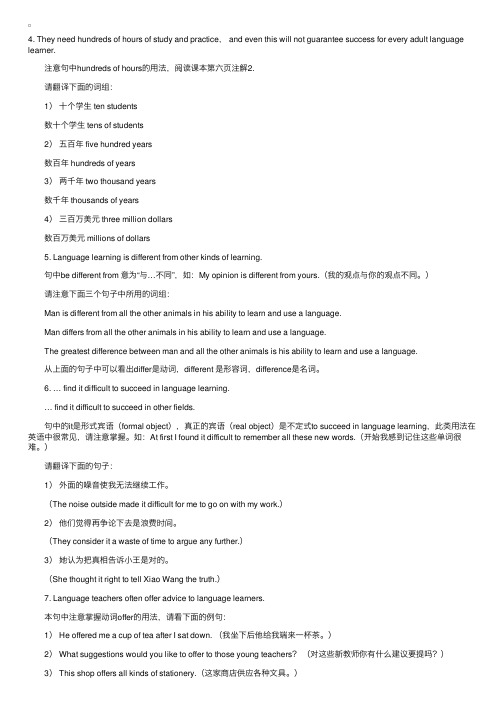
4. They need hundreds of hours of study and practice, and even this will not guarantee success for every adult language learner. 注意句中hundreds of hours的⽤法,阅读课本第六页注解2. 请翻译下⾯的词组: 1)⼗个学⽣ ten students 数⼗个学⽣ tens of students 2)五百年 five hundred years 数百年 hundreds of years 3)两千年 two thousand years 数千年 thousands of years 4)三百万美元 three million dollars 数百万美元 millions of dollars 5. Language learning is different from other kinds of learning. 句中be different from 意为“与…不同”,如:My opinion is different from yours.(我的观点与你的观点不同。
) 请注意下⾯三个句⼦中所⽤的词组: Man is different from all the other animals in his ability to learn and use a language. Man differs from all the other animals in his ability to learn and use a language. The greatest difference between man and all the other animals is his ability to learn and use a language. 从上⾯的句⼦中可以看出differ是动词,different 是形容词,difference是名词。
自考“英语(一)”课堂听课笔记第十一章(1)
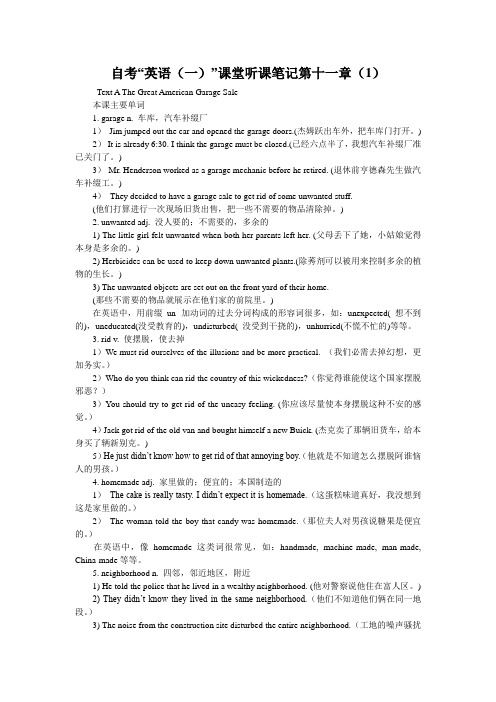
自考“英语(一)”课堂听课笔记第十一章(1)Text A The Great American Garage Sale本课主要单词1. garage n. 车库,汽车补缀厂1)Jim jumped out the car and opened the garage doors.(杰姆跃出车外,把车库门打开。
) 2)It is already 6:30. I think the garage must be closed.(已经六点半了,我想汽车补缀厂准已关门了。
)3)Mr. Henderson worked as a garage mechanic before he retired. (退休前亨德森先生做汽车补缀工。
)4)They decided to have a garage sale to get rid of some unwanted stuff.(他们打算进行一次现场旧货出售,把一些不需要的物品清除掉。
)2. unwanted adj. 没人要的;不需要的,多余的1) The little girl felt unwanted when both her parents left her. (父母丢下了她,小姑娘觉得本身是多余的。
)2) Herbicides can be used to keep down unwanted plants.(除莠剂可以被用来控制多余的植物的生长。
)3) The unwanted objects are set out on the front yard of their home.(那些不需要的物品就展示在他们家的前院里。
)在英语中,用前缀un--加动词的过去分词构成的形容词很多,如:unexpected( 想不到的),uneducated(没受教育的),undisturbed( 没受到干挠的),unhurried(不慌不忙的)等等。
3. rid v. 使摆脱,使去掉1)We must rid ourselves of the illusions and be more practical. (我们必需去掉幻想,更加务实。
- 1、下载文档前请自行甄别文档内容的完整性,平台不提供额外的编辑、内容补充、找答案等附加服务。
- 2、"仅部分预览"的文档,不可在线预览部分如存在完整性等问题,可反馈申请退款(可完整预览的文档不适用该条件!)。
- 3、如文档侵犯您的权益,请联系客服反馈,我们会尽快为您处理(人工客服工作时间:9:00-18:30)。
Lesson one:Rock Superstars: What Do They Tell Us about Ourselves and Our Society1. Rock Superstars 摇滚乐超级明星rock : rock music , rock ' n ' roll ( or : rock and roll )摇滚乐早期的摇滚乐是源于美国的民歌( folk )爵士乐( jazz )勃鲁斯歌曲(blues)等的一种音乐,其特征是具有强烈的节奏( rhythm )单纯的旋律( melody )一再重复的歌词和音符的后拍音( after beat )2. Rock is the music of teenage rebellion .摇滚乐是青少年的反叛音乐a. teenage adj. pertaining to a teenager ( 13 至 19 岁的)青少年的。
其名词形式为teenager:(13至19岁的青少年)。
b. rebellion : resistance to or defiance of any authority 造反,反派。
如; a rebellion against old traditions 对旧传统的反叛。
3. By a man's heroes ye shall know him. 你将从一个人崇拜的英雄得知其人。
a.这句句子的句型与英语中常说的 judge a man by the company he keeps(以一个人所交的朋友断定其为人)很相似。
b. ye = you 用于古英语或诗歌中,是第二人称代词thou的复数。
如:Ye are the salt of the earth .你们是社会的中坚。
(出自<>)4. " Midnight Ramblerramble :walk for pleasure漫游,既可表动词,也可作名词。
如; They rambled through the woods.他们在林中漫步。
5. …… he said," Grabs a half-gallon jug of water and runs along the front platform,sprinkling its contents over the first rows of sweltering listeners …… "a. grab : to seize suddenly , eagerly , or roughly ; snatch 急抓,夺取。
如: He jumped up from the table, grabbed his hat and ran out of the door.他从桌子旁跳了起来,抓起自己的帽子,奔出门去。
另外,grab后面可以跟其他名词或名词短语。
如:grab a shower快速冲了澡,grab a sandwich,胡乱吃了一个三明治,grab a taxi 赶搭 ******************************************************.有时,还可以作不及物动词。
如:He grabbed at the opportunity of going abroad. 他设法抓住这次出国的机会 b. sprinkle :to scatter drops or particles of water ,powder or the like on 洒液体,撒粉末等(于……上)。
如:They sprinkled ashes on the icy sidewalk .他们在积水溜滑的人行道上撒了灰。
We sprinkle the lawn every day .我们每天给草坪洒水。
以" sprinkling "引导的短语是动词的 " - ing " 形式做伴随状语。
再如:They stood there , watching the basketball .他们站在那里,观看篮球比赛。
6. They surge to follow him, eager to be touched by a few baptismal drops.a. surge : to move or swell forward in or like waves 如波涛汹涌而至。
A crowd surged out of the theater .观众从剧院里蜂拥而出。
b. 以形容词" eager "引导的不定式词组在语法功能上起着并列分句的作用。
7. Some 14,000 screaming fans were crunching up to the front of the stage at Capital Center……a. some :( before a number ) approximately , about (在数字前)大约。
如: some twenty students大约20个学生。
b. scream to make a loud , sharp cry 尖声大叫。
" screaming "是动词 scream的 " - ing "形式作前置修饰语, " screaming fans " 意为“尖声大叫的歌迷”c. crunch : to proceed with a crushing noise嘎吱嘎吱地往前。
如: The children crunched through the snow .孩子们嘎吱嘎吱地踩着雪走。
8. I ought to be crawling on my knees.a. crawled : to move with the face downward and the boys close to the ground 爬行。
如; The bus crawled along .公共汽车缓慢地行进。
注意:短语 crawl into the favor of one's superiors表示“卑躬屈膝地讨好上司”。
b. on one's knees :双膝跪地。
9. How do you feel about all this adulation and hero worshipa. feel about : consider , think of 觉得,感到。
经常用于疑问句中,如: How do you feel about the suggestion 你认为这个建议怎么样b. adulation 是adulate的名词形式。
adulate : flatter or admire excessively过分赞赏,奉承,恭维。
如: One can hardly understand why young people so adulate film stars.年轻人为什么如此过分赞赏影星,真让人费解。
10. Or are you drawn somehow to this strange clown , perhaps because he acts out your wildest fantasiesa. draw : attracts 吸引。
如: Some mutual interests draw us together .一些共同的兴趣把我们吸引到一块了。
b. somehow : in some way not specified or known 不知什么缘故。
如: Somehow I don't like this novel though it is so popular.这本小说虽然很流行,但不知什么原因我却不喜欢它。
c. fantasy : imagination , esp. when it is let free and not held back(自由奔放的)想象,幻想,狂想。
wildest fantasies ,最为狂妄的奇想。
11. These aren't idle questions.idle : of no real worth or purpose 无聊的。
如: idle rumor无聊的谎言。
12. Horwitz sees the rock music arena as a sort of debating forum, a place where ideas clash and crash.a. see …… as …… :consider …… as ……把……看作……b. forum : a meeting place of discussion of matters of public interest论坛。
c. a place 是a sort of debating forum的同位语,后面由 where引导的句子是定语从句,修饰 a place." ideas clash and crash "意为“各种思想冲撞”。
13. " The redefinition, " Horowitz says " is a task uniquely performed by the young……"" uniquely performed by the young " 是过去分词短语,用于修饰前面的"a task"。
14. It is they alone who combine invention and exaggeration……a. it is …… who ( that )是强调句式。
b. lone :( after a noun or pronoun ) only(在名词或代词后面)仅,只。
His name alone was enough to draw a large audience .仅仅他的名字就足以吸引一大批观众。
15. " Rock music," he says " is really a sociological expression rather thana musical force. "rather than : instead of 而不是(肯定前者,否定后者。
)比如:He is a poet rather than a novelist .与其说他是小说家,不如说他是诗人。
